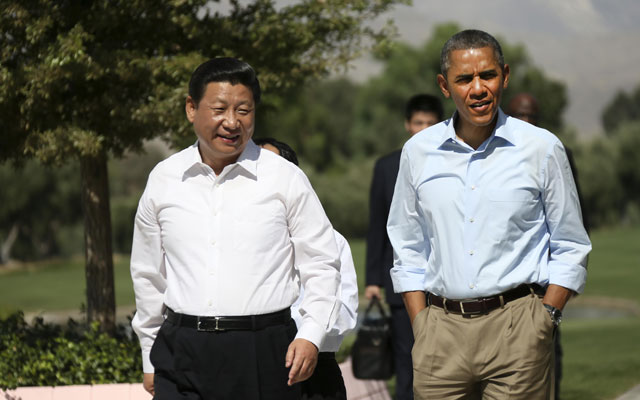The White House is spinning the U.S.–China summit as “quite unique and important meetings” between Presidents Obama and Xi, which resulted in “quite a bit of alignment” on North Korea. Harvard Professor Joseph Nye gushed, “This was the most important meeting between an American president and a Chinese leader in 40 years, since Nixon and Mao.”
Pundits credited the summit for being the catalyst for North Korea’s unexpected request to resume dialogue with Seoul. The media theory was that the Chinese tongue-lashing of a visiting North Korean envoy last month and Beijing’s new-found willingness to pressure Pyongyang pushed Kim Jong-un to embrace dialogue.
Apparently, Pyongyang ignored China’s missives and didn’t read the press because it affirmed that it would never abandon its nuclear weapons and canceled the inter-Korean meeting. So much for a summit deliverable.
Summit meetings are usually less substantial than might be expected. Rarely does a summit result in a landmark treaty, diplomatic breakthrough, or major policy reversal. Moreover, since it was coming so early in new Chinese leader Xi Jinping’s tenure, not much was expected from the U.S.–China summit. Yet the Obama Administration couldn’t resist hyping the style if not the substance of the meetings.
In describing the summit to the press, National Security Advisor Tom Donilon first highlighted the setting, style, length, and timing of the meetings and the fact that the meetings were brought about by holding lots of previous meetings, and that the summit would hopefully beget follow-on meetings.
Moreover, Donilon explained the meetings were part of the broader Asia Pivot strategy, which the Obama Administration emphasizes is more than just the (underfunded) military component, but also about having…wait for it…more meetings—certainly more than the Bush Administration did.
Meetings are important to affirm alliances, establish rapport among leaders, and push policy objectives. But it’s easy to get lost in the procedures and forget that meetings, dialogue, and engagement are tools to reach an objective, not objectives themselves. Designing a better hammer is fine, but it shouldn’t divert attention from the real objective of constructing a house.
Mr. Donilon claimed that the two sides “stressed the importance of continuing to apply pressure [to] halt North Korea’s ability to proliferate [and were in] full agreement that the Security Council resolutions which put pressure on North Korea need to be enforced.”
Yet, China’s post-summit statements don’t contain any reference to pressure on North Korea. Instead, Beijing’s comments were characteristically bland. President Xi merely “reaffirmed China’s persistence in keeping peace and stability on the Korean Peninsula” and that “China adheres to the principle that the issue be solved through dialogue and consultation.”
It’s interesting to note that a plethora of media articles always speculate on the positive implications of a development on North Korea. The removal of a hard-line general or announcement of inter-Korean talks must portend the ascension of a reformist faction.
Yet there is never a corresponding deluge of articles assessing continued North Korean intransigence when the converse happens, e.g., the hard-line general’s subsequent promotion to a more important position or Pyongyang cancelling the talks. The media should ask itself why the spin goes only one way.
Increasing transparency and reducing misperceptions between Washington and Beijing are laudable goals, but they should not obscure or detract from the real goals of protecting U.S. national interests and achieving American strategic objectives. Friction between Washington and Beijing—whether on North Korea or broader Asian issues—is not due to “misunderstandings,” but rather to strongly divergent principles and objectives. By now, four decades of diplomacy, Beijing’s consistent foot-dragging on North Korea, and its own increasingly assertive behavior should have removed any confusion…and delusions.





















